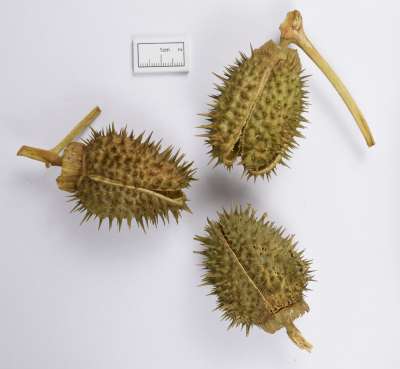Thorn-apple: devil’s snare: jimsonweed
These seeds were found in a collection on vegetable substances, fruits and seeds. They were collected from a plant in the grounds of the Isolation Hospital, Whipton, Exeter.
These prickly seed pods are from a plant that has many common names relating to its physical characterises and chemical properties. For example, the plant’s foul smell gives rise to the name ‘stinkweed’. Scientifically it is called Datura stramonium. Although it is native to North America, it is now found in warm climates worldwide, growing wild, in gardens and greenhouses.
The common name ‘thorn apple’ comes from the appearance of the seed pods (pictured). The spikey olive-green capsules swell and dry as they mature and contain many small black seeds. Gardeners often call this plant ‘angel’s trumpets’ because of the beautiful, long, lily-like flowers. In this species of Datura they are white with a purple centre
Datura stramonium’s other common names hint at this plant’s rather more sinister properties. Devil’s snare, hell’s bells and devil’s cucumber are just a few. It has been used in traditional medicine for centuries. In India the leaves are smoked to relieve the symptoms of asthma and in some parts of North America and China it used as an anaesthetic and painkiller. However, like so many plants used in medicine, it is also highly toxic and can kill. All parts of the plant contain compounds that can cause delirium, hallucinations, increased heart rate and increased body temperature.
These prickly seed pods are from a plant that has many common names relating to its physical characterises and chemical properties. For example, the plant’s foul smell gives rise to the name ‘stinkweed’. Scientifically it is called Datura stramonium. Although it is native to North America, it is now found in warm climates worldwide, growing wild, in gardens and greenhouses.
The common name ‘thorn apple’ comes from the appearance of the seed pods (pictured). The spikey olive-green capsules swell and dry as they mature and contain many small black seeds. Gardeners often call this plant ‘angel’s trumpets’ because of the beautiful, long, lily-like flowers. In this species of Datura they are white with a purple centre
Datura stramonium’s other common names hint at this plant’s rather more sinister properties. Devil’s snare, hell’s bells and devil’s cucumber are just a few. It has been used in traditional medicine for centuries. In India the leaves are smoked to relieve the symptoms of asthma and in some parts of North America and China it used as an anaesthetic and painkiller. However, like so many plants used in medicine, it is also highly toxic and can kill. All parts of the plant contain compounds that can cause delirium, hallucinations, increased heart rate and increased body temperature.
Object Summary
- Accession Loan No.
- 25/2001/4
- Collection Class
- Plants
- Collection Area Region
- Northern Europe
- Common Name
- thorn-apple: devil’s snare: jimsonweed
- Simple Name
- capsules and seeds


